DU making a difference in the Mississippi Delta
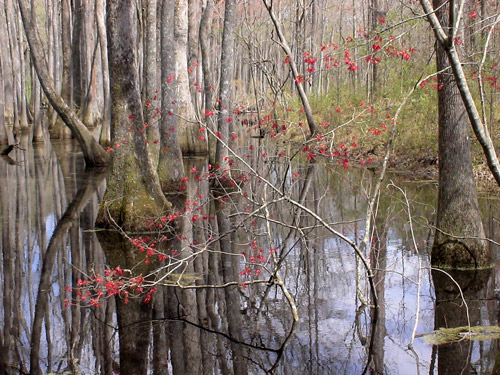 The Mississippi Delta |
Known as the birthplace of the blues, the inspiration for myriad works of literature and a duck-hunting history as rich as its soil, the Mississippi Delta provides critical habitat for migrating and wintering waterfowl.
Ducks Unlimited focuses its conservation programs in the Magnolia State on the Mississippi Alluvial Valley, known locally as the Delta. Since beginning habitat conservation work in Mississippi, DU and its partners have conserved more than 255,000 acres across the state (as of July 2010).
Through a strong partnership with the Mississippi Department of Wildlife, Fisheries and Parks; the U.S. Forest Service and the U.S. Fish and Wildlife Service, DU works on public lands in Mississippi to ensure the Delta's waterfowling heritage remains for generations to come. Recent public land projects involved restoration at Panther Swamp and Morgan Brake in the Theodore Roosevelt National Wildlife Refuge Complex, improvements to Charlie Capps and O'Keefe wildlife management areas and continuing habitat enhancements in Delta National Forest.
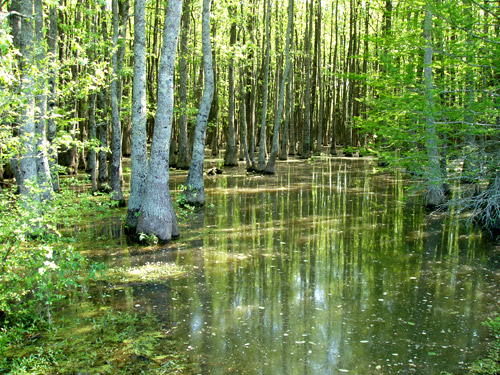 Public wetland area worked on by Ducks Unlimited in Panther Swamp National Wildlife Refuge, part of the Theodore Roosevelt NWR Complex. |
"In that past two years, the MDWFP Waterfowl Program has enlisted the services of Ducks Unlimited engineers to complete topographical survey and design work and perform construction management at Charlie Capps and O'Keefe WMAs," said Ed Penny, MDWFP waterfowl program coordinator. "When complete, these projects will be managed for waterfowl and quality public hunting opportunities. DU provides valuable engineering services to us as we seek [North American Wetlands Conservation Act] funding and work to complete projects on our WMAs."
Ducks Unlimited's ability to help restore public land habitat is limited by funding availability. Public land improvements are often funded in part by grants from NAWCA, a crucial source of waterfowl habitat funding. Every NAWCA grant dollar has to be matched with a minimum of two non-federal dollars. This is where partners, corporations and major sponsors become critical allies.
"Major sponsors are committed to leaving a legacy of wetlands and waterfowl for their children and grandchildren. I am constantly amazed at their generosity and their passion for the resource," Chad Manlove, DU director of development said. In Mississippi, more than 130 major sponsors support our conservation work through generous giving.
The Wetlands Reserve Program, administered by the USDA Natural Resources Conservation Service, is a voluntary, non-regulatory, incentive-based program for private landowners, farmers and ranchers. The program provides an avenue for farmers and ranchers to remove marginal croplands from production while protecting and restoring the functions and values of wetlands on their property.
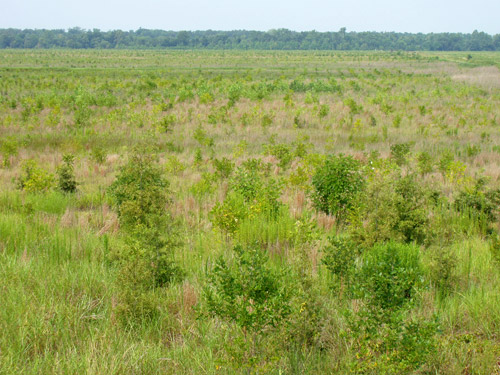 Wetlands Reserve Program tree planting in Mississippi |
Ducks Unlimited plays an important role with on-the-ground restoration work on land enrolled in WRP. NRCS contracts with DU to restore hydrology and re-establish bottomland hardwoods on easements acquired through WRP.
"The Mississippi Delta has very productive soils, which make it one of the most intensively farmed regions in the United States," said Dr. Curtis Hopkins, director of DU's Southern Region. "Delta farmers grow several million acres of cotton, rice, soybeans, corn and catfish annually."
Producer demand for this popular program outstrips available funding by at least a 3:1 margin. That is why Ducks Unlimited is working hard to make sure Congress reauthorizes the program and increases the acreage cap in the 2012 Farm Bill.
"WRP isn't just for waterfowl," said Hopkins. "Croplands enrolled in WRP are planted with bottomland hardwood tree species that trap sediments and filter nutrients that would otherwise end up in Delta rivers. Reforestation provides cleaner water, decreases soil erosion and creates critical habitat for many wildlife species including white-tailed deer, wild turkey and waterfowl."
"Because so much of the MAV has been cleared for agriculture, one of our main focuses in the area is permanently protecting the remaining forested habitat through conservation easements," said Dale James, land protection coordinator for DU's Southern Region.
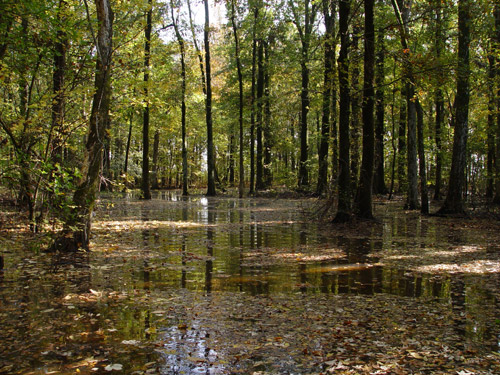 Conservation easement in Irby Woods; an example of the remaining bottomland hardwood forests in the Mississippi Delta |
DU's conservation easement program helps private landowners permanently protect their land from development through an agreement. Landowners work with DU staff to tailor easements to the conservation values and characteristics of a particular property, as well as to their own needs, objectives and conservation goals. In most cases, easements allow landowners to continue using their property for hunting, fishing, agriculture and timber production while protecting the natural integrity of the land. The easement typically calls for a forest management plan that benefits both landowners and wildlife.
"Because private landowners hold most of the undeveloped land in the United States, including 75 percent of the remaining wetlands, easements are an increasingly vital tool for conservation," James said. "Mississippi landowners have committed to permanently protecting 79,000 acres with donated conservation easements."
DU's goal is to secure the future of Mississippi as a key migration area for waterfowl in North America.
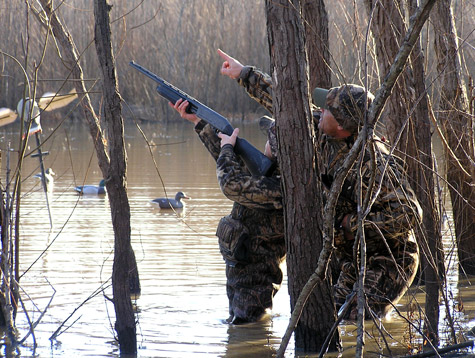 Children are the future of Mississippi conservation-take your kids out hunting and sign them up for a Greenwing membership today! |
Ducks Unlimited celebrated its more than 130 Mississippi Legacy Greenwing members in 2008 by dedicating an Oktibbeha County wildlife area project in their honor. Nearly 100 DU Greenwing youth, parents and grandparents joined members of the Mississippi Department of Wildlife, Fisheries and Parks and DU volunteers and staff to place three plaques at Trim Cane Wildlife Area.
"Greenwings are the future of DU and wetland conservation," said Bruce Lewis, past president of Ducks Unlimited and Mississippi native. "The Legacy Greenwing youth members we recognized on this project today are the wetland conservation leaders of tomorrow."
The Missouri Coteau of south-central Saskatchewan provides an array of wetland and upland habitat for North America's waterfowl. Ducks Unlimited major sponsors in Mississippi truly understand and appreciate the importance of habitat conservation projects in Canada, as this landscape produces waterfowl that winter and migrate through Mississippi. The Forbes Project is comprised of four individual project segments totaling nearly 700 acres. More than 300 acres of annually cultivated cropland have been converted to dense nesting cover, and 60 acres of wetlands have been restored. Additional native prairie previously used as livestock pasture is now managed for waterfowl production. The following sponsors generously provided funding for the Mississippi Connection Project: Marc and Lainie Anthony, Pam and Larry Edwards, Dr. Marshall and Teresa Hollis, Bruce and Karen Lewis, Joe and Janet Moss, Larry and Sheila Roberts, Neal and Sarah Ballard, Rodney and San Garrison, Curtis and Sharon Hopkins, Jack Moss, Ronal and Patti Roberson and Rea Taylor.
Ducks Unlimited uses cookies to enhance your browsing experience, optimize site functionality, analyze traffic, and deliver personalized advertising through third parties. By continuing to use this site, you agree to our use of cookies. View Privacy Policy